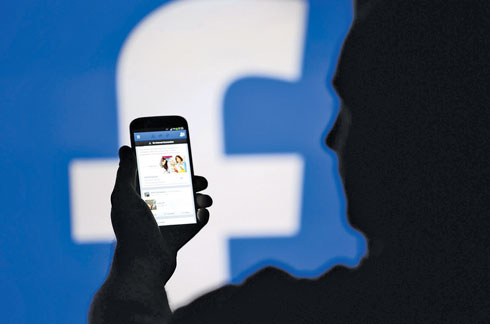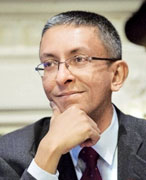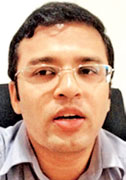 Faking
it on Facebook Faking
it on Facebook
The danger in accepting ‘friend invites’ from
unknowns:
Facebook has over 1.18 billion active users in the world. But not
everyone is genuine. In what is turning out to be dicey development that
screams ‘menace’, fake profiles continue to crop up every so often,
rendering to inconsequential the social network’s efforts to wipe them
off.
With more than 2.5 million users, Facebook is Sri Lanka’s most
popular social media platform. It is also the most abused, requiring
users to tread with caution when posting personal information or images.
Abusing the facilities in this social media platform or any other,
for fun or with malicious intents constitutes a cyber crime, a
transgression handled by the Criminal Investigations Department and the
Technical Unit of the Sri Lanka Police. Cyber crimes are punishable
offences, but the police are not in a position to swoop down and
apprehend the perpetrators of this crime, due to myriad reasons, placing
the onus on the users to be vigilant and extra cautions about the safety
of their accounts. Not unlike a motorist or a pedestrian, or even a home
owner.
2000 complaints
There are privacy policies that protect the large numbers of active
users from people intent on mischief or harm. Despite these precautions,
the Coordinating Centre of the Sri Lanka Computer Emergency Readiness
Team Coordination Centre (SLCERT CC) had received more than 2000
Facebook related complaints by the end of September 2015.

Science Writer and new
media researcher/
commentator,
Nalaka Gunawardene |

Managing Director, Red
Pinnacle (PVT) LTD,
Buddhika Fernando
|

SLCERT CC, Senior
Information Security
Engineer Roshan
Chandraguptha |
SLCERT CC, Senior Information Security Engineer Roshan Chandraguptha
says 60 percent of the complaints are from females and 40 percent are
from males, and that the age rangers from 17 to 45. Pointing out that
people who create fake accounts using real pictures are not monitored,
he says there are several reasons why some resort to creating fake
accounts. “Some people create one to take revenge, some for illegal
purposes, and some others to tarnish the image of a person,” he says,
admitting that many children under the age of 13 open accounts by
providing false information. “This too is considered as fake,” he
claims.
He says SLCERT CC has also received complaints regarding unauthorized
pictures published in Facebook and on other website. “You can make a
report to Facebook claiming that your pictures are being used in
different pages without your consent. Then FB will remove these
pictures,” he explains, pointing out that when Facebook users publish
pictures they need to make sure that the pictures are visible only to
the relevant parties.
Unknown people
“If you have used the public setting any one on Facebook can see the
pictures. That is how your pictures get into the hands of strangers. If
you make sure that your Facebook settings are correctly used, then you
don’t have to face such types of incidents.” Chandragupta elaborates,
acknowledging that the public can report about any fake accounts to the
Facebook team. He also warns that it is dangerous to have unknown people
in the friends list as that can cause a lot of harm.
Users and
those abused
Active Facebook users and those who have been abused by
people using fake accounts:
Maheshika
Perera
–
“Recently I was abused by a fake account.
When I was using the FB account I saw a list saying people
you may know, when I was checking it I saw a profile of
someone using my profile picture. Analysing it, I realized
it was a fake profile. I reported it to the FB team and I
told all my friends to report it. Then the Facebook team
deleted the account. It was a very bad experience.”
Bhagya
Pieris –
“I am very social person and most of my
friends are abroad. So Facebook is really helping me to get
in touch with them and share my stuff. Actually I am
addicted to Facebook and very active but I never got abused
by people because of my privacy settings. I never add
unknown people to my account. I have thousands of pictures
of myself but luckily I have never got hurt. My advice is to
use Facebook correctly. Do not add unknown and disturbing
people if you want to be safe. One should have the ability
and common sense to identify fake Facebook profiles.”
Faumi Fauz
-
“I think FB is great because you get to
keep in touch with the people in your life. The people you
grew up with but are no longer in the same place. So it is a
great and cheaper way to stay connected. We get Facebook
pages of various user interests, news, entertainment; latest
updates on pretty much everything you need to know about in
this technologically advanced era we are living in
currently. Fake accounts are very common these days. I see a
bunch of them and I do get friend requests from them time to
time. It is very easy to identify a fake account. I would
say at least for me. Not all people would use Facebook for
the same purpose. Another user may use it to make new
friends virtual since he or she could have a social anxiety
problem.”
Gayan
Fernando –
“It is good to have one as long as you
know your limits and use it with caution. I use it to keep
in touch with friends overseas, outstation, childhood
friends, close colleagues and contacts and to know the
important happenings in their lives, such as jobs,
achievements, marriage and kids. I have heard some cases
related to FB, in one of them I heard that the victim of a
blackmail case could not even step outdoors for months.
Sadly some cannot even take legal action in fear of
repercussions. Especially for girls, if they do not want to
get involved in complicated issues or troubles, it is best
to keep away from total strangers at all times.” |
Contrary to Chandraguptha’s views, Managing Director, Red Pinnacle (PVT)
LTD, Buddhika Fernando, says he does not see anything wrong in a person
having a fake account and that people come across situations where they
will have to hide their real identity. “The most important thing is the
way one uses the account,” he says, adding, “If we should add only
people whom we know, and then it will not serve the purpose of
networking. We normally are not really having relationships with 5,000
people in our lives but on FB it is possible. Then why did the FB team
allow 5,000 friends into the list as the maximum amount? For example if
I want to raise my voice to legalize prostitute in Sri Lanka, I will
have to hide my identity due to social barriers so everything lies on
the purpose. The people in Sri Lanka are not yet advanced enough to
properly use the technical tools.”
Regulate and monitor
Fernando believes that the government along with the Ministry of
Technology should take steps to regulate and monitor social media and
that parents and teachers should monitor and control how
children/students use social media.
|
Basic
precautions in computer use
Use a complex password; never share it
with anyone; also never leave it written anywhere; and
change it from time to time. Always exit accounts when a
session ends. The most important thing to remember: we have
decision making power to decide who can see what we share,
and how much they can see.
-Nalaka |
Science Writer and new media researcher/commentator, Nalaka
Gunawardene says it is essential that Facebook be used with some
precautions, in a manner similar to how roads are used with a sense of
road safety. “There is no foolproof way to verify an account holder’s
identity online, so vigilance is always needed and verification is a
good idea,” he says, elaborating that on Facebook, when we accept a
friend request from someone, we provide our new friend access to lots of
information about ourselves. The updates, photos, messages and
background information that we provide he says, can be misused by the
‘friends’ we have accepted.
Prevent problems
“This is why it very important to add only those individuals we know
personally, in real life. Even then, if we are not sure if a given
account actually belongs to someone we know, it is always good to check
with him or her through a phone call. This sounds tedious, yes, but it
can prevent problems later,” he says, pointing out that Facebook also
has privacy settings, which can be used to decide who gets to see what
in the account. “Most users are unaware of these facilities, or just do
not bother. The price they pay is loss of privacy and potential misuse
of their personal info or images,” he points out.
Gunawardene says many of the computer and social media users are also
not careful with their passwords. They either choose a password that can
be guessed easily, or worse, they share password with friends, family
members or lovers. “Very often, accounts are hacked into or ‘hijacked’
by known persons who had access to password. In particular, when some
lovers fall out, they now resort to this kind of hacking and account
hijacking activity,” he says.
He is also critical of how people also keep their Facebook accounts
open all the time. “This is not a good idea, especially if the computer
terminal is shared. Anyone can then access our account. On shared
terminals, we must always log out when finished,” he says.
Reported by Husna Inayathullah
|

